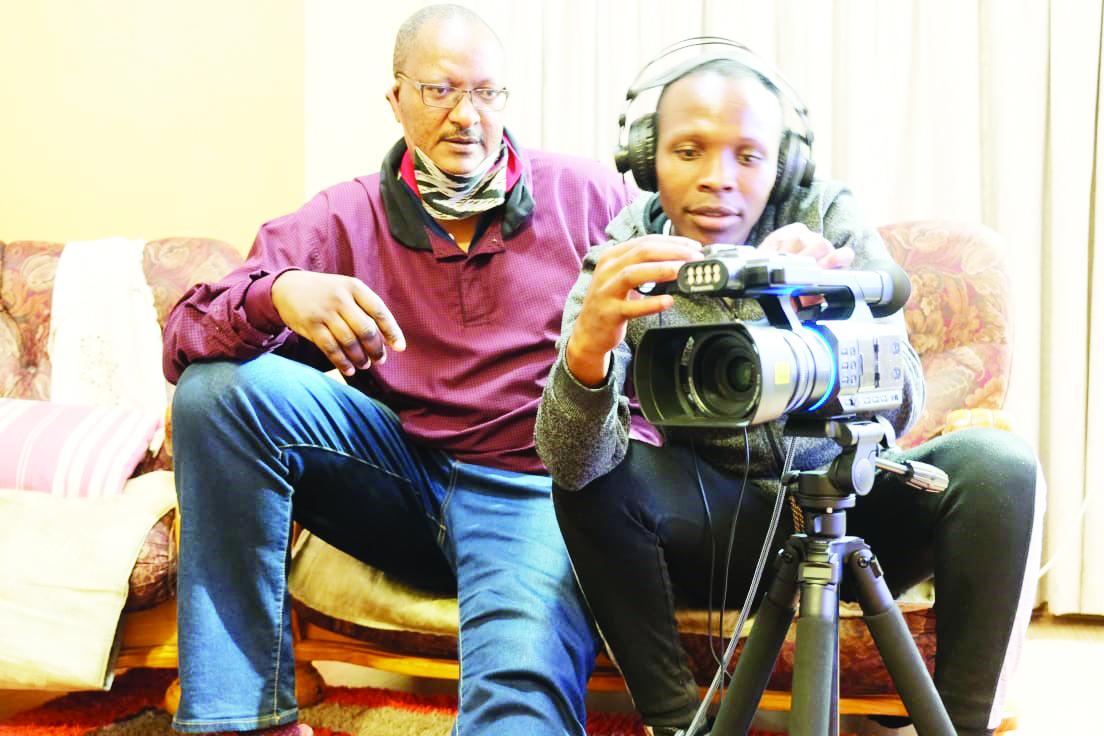Africa-Press – Lesotho. Parts of footage for Nigerian documentary ‘Acceleration’ have just been shot on location in the country. The documentary focuses on the COVID-19 on professional women.
For three days Senior Project Manager of the Film Sector Groundbreakers (FSG) Lesotho who is also a film industry development facilitator, Aubrey Silinyana, was in Maseru coaching on-the-job two young Basotho emerging filmmakers Kevin Pule and Rantsatsi Mokeki.
The footage captured and shot on Fujifilm and Panasonic gear will be sent to Nigeria where it will be edited with other footage that was captured in other countries. Pule and Mokeki are part of an emerging filmmaker incubation programme in the country.
FSG is a registered company based in Maseru with the sole objective of facilitating the film industry development in the country, and Silinyana, a South African filmmaker, has partnered with Tlali Tlali, a Mosotho businessman, in birthing the project in 2019.
The company organizes social events of film screenings and facilitate networking opportunities for its members and invite film and television industry gurus to run various workshops.
Initially Silinyana was hired to shoot the documentary in South Africa under his production company there, but chose to bring it to Lesotho in order to create opportunities for Basotho emerging filmmakers to earn an income and acquire practical experience in working on big projects.
“I was very much impressed with how much my team performed, this was their chance to acquire knowledge and get international recognition,” said Silinyana speaking to Life&Style following the shooting.
Pule directed the entire production working directly with the Nollywood producers and also head hunted the two women who got interviewed and also facilitated paying them appearance fees.
Mokeki was in charge of location scouting, sound recording, lights and logistics. “The shooting went very well. From the production crew side I was very satisfied in terms of the equipment, the setup, people that we worked with.
I was in charge of sound, set preparation and transport. Everything was satisfying because the equipment we were using was very good. Better cameras with a very very good quality and the sound equipment were on point.
The set preparation was also on point because everything was what I could handle. And for transport, there was a budget for the entire shooting so everything really worked out well,” says Rantsatsi.
“There were no serious challenges because the much better advantage was that the documentary had a budget.
So in a process of learning, where you only worry or rather put your mind on what you were doing, and not stressing about how you are going to handle issues that has to do with the budget, is very breathtaking.
You put your mind and fully concentrate on what you are doing. And by doing so, you are very confident to do an exceptional job. I think I have not encountered any challenges,” he added.
In April this year, FSG launched its first ‘film industry shakeup workshop’, which was a four-day workshop that is meant for everybody interested in being a part of the film industry. In that workshop, experts in the film industry were invited in order to equip film lovers with the necessary know-how in the film field.
This first workshop that also enabled the founding of several local film clubs was headed by Silinyana in association with three other young Basotho film sector gurus ‘Mamokone Liphoto, Habofanoe Letsosa as well as Khetsi Rapita.
For More News And Analysis About Lesotho Follow Africa-Press






